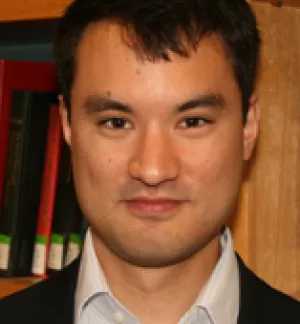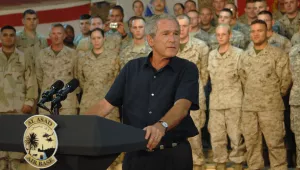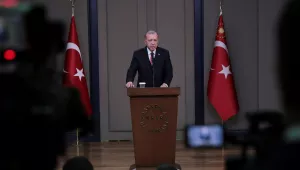IRAQI Prime Minister Nouri al-Maliki's recent visit with President Obama clearly revealed something that Americans should note: the emergence of the most powerful political figure in the country since Saddam Hussein. As Iraq transitions from a country under occupation to one with restored sovereignty - and one that now obliges the United States to remove combat troops from the country by 2012 - Maliki probably will flex his political muscles and make more and bolder independent decisions. His ascendancy should give the Obama administration pause, as he might have become what the 2007 National Intelligence Estimate termed the "Shia strongman'' who would replace the political vacuum left by the removal of Saddam.
Maliki's journey to power was far from certain, even a few years ago. As an exile who lived in Syria and Iran since the late 1970s, Maliki commanded the Dawa Party's Damascus branch and worked with Shia insurgents to fight against Saddam Hussein. After the US invasion in 2003, Maliki took a role in the de-Baathification Commission for the interim Iraqi government, a process that did not endear him to much of Iraq's Sunni population, who viewed it as a sectarian purge.
A consensus candidate for prime minister in 2006, his major qualification was that he was a bit more likeable and more politically palatable than his predecessor. At the time, many US policymakers dismissed him as a second-rate leader, soon to leave the political stage. A late-2006 leaked memo from National Security Adviser Stephen Hadley explicitly portrayed Maliki as ineffective, naïve, and focused on personal sectarian goals. Senator John McCain emphasized in 2007 that he was "concerned about Maliki and his strength.'' Then-Senator Hillary Clinton at one point called for his removal in favor of a "less divisive and more unifying figure.''
Nonetheless Maliki, through political dexterity, grittiness, US support, and some fortuitous events, has presided over a remarkable transition in Iraq. Under his leadership, the Iraqi national conversation moved from a singular focus on security and stability to a greater emphasis on reconciliation and reconstruction. The Shia-dominated Ministries of the Interior and Defense and a windfall from oil revenues haven't hurt his standing in the government either.
This confidence and his seeming desire to pursue an agenda contrary to explicit American wishes, however, has at times left the United States displeased. In the spring of 2008, for example, Maliki undertook a major - and militarily inconclusive - armed assault on Basra, the second largest city in the country, while informing senior US officials only shortly before the assault. His government has remained reluctant to absorb the Sunni fighters, despite continued US pleas to incorporate them into the existing security forces.
What does a powerful Maliki mean for the United States? The continuing headache that this Iraqi prime minister gave to President Bush may indeed carry over into this administration, despite Maliki's non-endorsing "endorsement'' of Obama during the US presidential campaign. Nevertheless, given the drawdown of US troops in Iraq, having a strong man in Baghdad - whatever his ethnic or confessional background - is not the worst of all outcomes. Furthermore, given that much of Iraq under his tempestuous leadership has become more secure than a few years ago, it would give the United States the political cover to exit Iraq honorably.
Maliki's power in this intervening time will most likely grow, and, absent any new shock to the system, will lead skeptics to question whether this Shia leader will indeed become the new Iraqi Saddam. In reality, Maliki remains constrained by a host of political realities: restive Kurds; antagonistic Sunnis; malicious Sadrites; meddlesome Iranians; the possibility of a nationwide backslide into sectarian warfare; and larger issues of institution-building in a fragile state. And given his background, there is little to indicate that absent a US presence he will behave in a more brutal fashion toward his adversaries.
We have yet to see a fedora-wearing Maliki wildly fire a rifle into the air during a grand military parade. But then again, he just might keep that hat and rifle out of public sight until the full departure of US troops.
Eric Rosenbach is executive director of the Belfer Center for Science and International Affairs at the Harvard Kennedy School. Aki Peritz is a fellow at the Belfer Center.
Rosenbach, Eric and Aki J. Peritz. “What Maliki’s Power Means for US.” The Boston Globe, July 24, 2009







